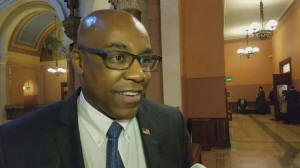Attorney General and state board of education address 'school-to-prison'
pipeline
 Send a link to a friend
Send a link to a friend
 [March 08, 2022]
By Kevin Bessler
| The Center Square [March 08, 2022]
By Kevin Bessler
| The Center Square
(The Center Square) – Illinois officials
have released guidance to address the connection between school
discipline policies and increased rates of incarceration, sometimes
called the “school-to-prison” pipeline.
The guidance from the Illinois Attorney General’s Office and the
Illinois State Board of Education is a resource to ensure public K-12
school districts meet their legal obligations under state and federal
civil rights laws.

“The school-to-prison pipeline is a term that is used to refer to the
connection between punitive and exclusionary disciplinary practices in
schools, and then leading to increased rates of incarceration,” said Amy
Meeks, civil rights bureau chief with the Illinois Attorney general’s
office. Adolescents who attend schools with high suspension rates are
substantially more likely to be arrested and jailed as adults, according
to the fall 2021 issue of the journal Education Next. Researchers found
that Black male students are more than three times as likely to be
suspended from school as white male students.
Under the law, schools must administer student discipline policies
without discriminating on the basis of race, color, gender, national
origin, sexual orientation or other protected characteristics.
[to top of second column]
|

Illinois attorney general Kwame Raoul
Greg Bishop | Watchdog.org
 The AG’s office and ISBE recommend
that schools take a trauma-informed approach to school discipline
and prioritize equity for all students.
“Data shows that there is a connection between exclusionary school
discipline policies and increased rates of incarceration,” Kwame
Raoul wrote in a statement. “School districts have a responsibility
to ensure that disciplinary policies and practices do not
disproportionately impact students of color.”
Illinois law requires school boards to conduct annual reviews of
discipline policies and their implementation.
“Punitive and exclusionary discipline are not what students need to
get back on track academically,” state Superintendent of Schools
Carman Ayala said in a statement. “We are proud to partner with the
Attorney General’s Office to provide guidance on school discipline
to support holistic, evidence-based practices that contribute to a
safe and positive school culture for all students.”

|